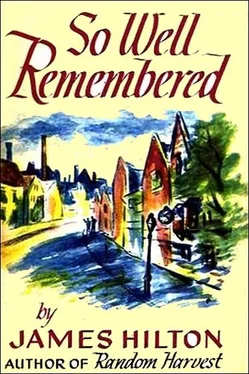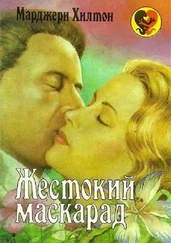Джеймс Хилтон - So Well Remembered
Здесь есть возможность читать онлайн «Джеймс Хилтон - So Well Remembered» весь текст электронной книги совершенно бесплатно (целиком полную версию без сокращений). В некоторых случаях можно слушать аудио, скачать через торрент в формате fb2 и присутствует краткое содержание. Год выпуска: 1945, Жанр: Проза, на английском языке. Описание произведения, (предисловие) а так же отзывы посетителей доступны на портале библиотеки ЛибКат.
- Название:So Well Remembered
- Автор:
- Жанр:
- Год:1945
- ISBN:нет данных
- Рейтинг книги:5 / 5. Голосов: 1
-
Избранное:Добавить в избранное
- Отзывы:
-
Ваша оценка:
- 100
- 1
- 2
- 3
- 4
- 5
So Well Remembered: краткое содержание, описание и аннотация
Предлагаем к чтению аннотацию, описание, краткое содержание или предисловие (зависит от того, что написал сам автор книги «So Well Remembered»). Если вы не нашли необходимую информацию о книге — напишите в комментариях, мы постараемся отыскать её.
So Well Remembered — читать онлайн бесплатно полную книгу (весь текст) целиком
Ниже представлен текст книги, разбитый по страницам. Система сохранения места последней прочитанной страницы, позволяет с удобством читать онлайн бесплатно книгу «So Well Remembered», без необходимости каждый раз заново искать на чём Вы остановились. Поставьте закладку, и сможете в любой момент перейти на страницу, на которой закончили чтение.
Интервал:
Закладка:
Martin’s body was wedged between rocks where the river poured in spate; she made the discovery quickly because Becky jumped into the torrent near the exact spot. She tried to drag the body out of the water, but lacked the strength. She noticed later that where the path came nearest to the rocks there had been a small landslide.
It was full dawn as she returned to Stoneclough. Sarah was still asleep, Watson had been out all night; the house was cold and grey and silent. Entering it she knew she could not tell anyone yet; she felt herself spinning into unconsciousness as she flung herself on a couch in the drawing-room. Just a little while to gain control, and then hold it for a lifetime— just half an hour, maybe, until the sun was up, until Sarah, taking tea to his room, would herself discover the absence. Presently she noticed that Becky was wet and shivering, and the dog’s simple need roused her to equally simple action. But a moment later, while she was in the kitchen rubbing him with a towel, some men appeared in the yard outside. They were Browdley Council workmen, in charge of an engineer; they had walked up the clough to see if the flood-water was abating; and in so doing they had found Martin’s body.
One of the workmen claimed afterwards that when Livia was given the news she said in a low voice, “Yes, I know,” but she denied this later in the morning to Dr. Whiteside, and under his tactful handling the matter was not raised at the inquest, though it was freely gossiped about in the town. She was so distracted, anyhow, that (as all the men agreed) she might not have known what she was saying even if she HAD said it. But it was still a little odd, as were a great many other things.
Part Three
Christmas and the Christmas Number of the Guardian came a few weeks later, and George Boswell, summarizing the local events of the year in a special article, then wrote as follows:
“… In November Browdley suffered its worst floods within living memory, while in the same month the death, under suspicious circumstances, of Mr. John Channing, of Stoneclough, recalled the Channing Mill crash of a generation ago—an event notable in the history of our town both on account of the number of its victims and the sensational criminal trial that followed it…”
When George handed this to Will Spivey, his sub-editor, printer, proof-reader, ad-salesman, and general all-purposes assistant, the latter scrutinized it, grunted, then carefully blue-pencilled the word “suspicious”.
“You can’t say that, George.”
“Why not? Isn’t it true?”
“Have ye never heard ‘the greater the truth the greater the libel’?”
“Libel? Who’s libelling who?”
“The verdict at the inquest was ‘accidental death’.”
“Aye, and everybody knows why—because old Whiteside was coroner and made ‘em believe what the girl said… As if anyone sober or in his right mind would be taking walks in the clough at night during the worst storm for years—”
“I know, George. And there’s some say he wasn’t sober and there’s others say he wasn’t in his right mind and I’ve even heard it whispered that—”
“Nay—I’m not saying or whispering anything, because I simply don’t know and I refuse to believe gossip. I’m just content with the word ‘suspicious’.”
“No good, George. The jury found it was accidental—you can’t contradict ‘em. Change to ‘tragic’ and you’ll be safe.”
George reluctantly made the substitution. It was his first year as editor and he did not want trouble. Already he had discovered that the written word had more pitfalls than the spoken, and that the Guardian was a rather sickly infant whose survival could only be contrived from week to week by the most delicate nursing.
“There you are then,” he muttered, handing back the corrected copy. “And if I’m safe, that’s more than Channing’s ever was…”
Ever since he could remember, the Channing name had been part of his life. He had known that his father worked at ‘Channing’s’ before he had any idea what Channing’s was, and when he was old enough to associate the word with the humming, three-storied, soot- blackened cotton mill at the end of the street, it had taken shape in his mind as something fixed, universal, and eternal. As a child the rows of windows had seemed endless to him as he walked under their sills, and it became an exciting dream to think that as he grew up he would presently be tall enough to see through them. When that time did come he found there was nothing to see—just the faint suggestion of moving wheels behind the wired and murky glass, with the humming louder when he put his ears to it. He had grown up to feel that work at Channing’s was in the natural order of events, like play along the canal-bank and chapel on Sundays. Indeed, it was the shrill Channing’s ‘buzzer’ that marked Time, and the Channing’s brick wall that marked Space, in his own small boy’s world.
Even after the death of his parents, when he had gone to live with his uncle in another part of the town, Channing’s merely acquired an extra attribute, for Uncle Joe called it ‘safe’. George soon learned that it paid his uncle, who did not work there, just as regularly as it had paid his father, who HAD worked; though why this should be, he could not imagine. It was, however, of importance because his uncle had promised to send him to Browdley Grammar School and pay the fees out of ‘the Channing’s money’. Then suddenly disaster struck. Even to an intelligent schoolboy it was all rather incomprehensible, for the mill still stood, not a brick disturbed, not a cadence lost from the call of its early morning and late afternoon siren; and yet, in a way that undoubtedly hurried Uncle Joe to his grave, Channing’s proved no longer ‘safe’.
So George, because of this, had left an elementary school when he was thirteen, and had taken various jobs that gave him nothing but a series of pointless and not always pleasant experiences, and then had come the war, with more pointless and not always pleasant experiences—in France and elsewhere. During this time, however, his dissatisfactions had acquired a pattern, and the pattern had acquired a trend; so that on seeing Browdley again, war-injured but recovering, at the age of thirty, he had known what he wanted to do and had begun right away to do it. At a Council by-election he won a victory that surprised even himself, while about the same time he took over the almost bankrupt Guardian.
And after several months the Guardian was still almost bankrupt. For one reason, it had no monopoly (the Browdley Advertiser, one of a chain of local papers, enjoyed a far bigger circulation), and Browdley folk remained obstinately fixed in their reading habits even when an increasing number of them favoured George’s political opinions. He would have been badly off indeed but for the small printing establishment (two hand presses with three employees), which not only put out the regular weekly edition but also received official printing jobs from the Browdley municipality. And here, of course, lay an obvious opening for George’s political opponents, some of whom whispered “graft” whenever the Council (George scrupulously absenting himself from the vote) decided to hand him another contract. That they did so at all, however, testified to his rising popularity as well as to the fact that the enmities he made were rarely bitter or lasting. The truth was, as an enemy once remarked, it was damned hard to hate George, and whispers of graft did not stick very well because, graft or no graft, it really was quite obvious that he was not lining his pockets with any considerable success. He lived modestly in the oldish, inconvenient house which, adjoining the printing works, he had acquired when nobody else wanted either; and he often found it as hard to pay his newsprint bills as to collect from some of his customers. He dressed rather shabbily and rode a bicycle except when official business entitled him to the use of a municipal car. The local bank-manager and income-tax assessor knew all these and other pertinent details, but as they belonged to the opposition party they were constrained to attack him in reverse: if, they argued, George succeeded so meagrely with his own small business, how could Browdley feel confidence in his capacity to run the town? But humbler citizens were not much influenced by this. Most of them knew George personally and felt that his total lack of prosperity made him all the more human, municipal contracts or not. They LIKED him, in fact, and a great many fought his battle, and if a few of them fought it bitterly, he would sometimes reward them with a speech that made them think he was secretly as bitter as they were. But in that they were wrong, for George was just fiery, effervescent, genuinely indignant over much that he saw around him, but incurably romantic about what he saw in his own mind. He was also na ve in the way he tackled his opponents—first of all overwhelming them with a sort of Galahad impetuosity, then wondering if perhaps he had been a little unfair, and later—as often as not—making some quixotic gesture of retractation or conciliation.
Читать дальшеИнтервал:
Закладка:
Похожие книги на «So Well Remembered»
Представляем Вашему вниманию похожие книги на «So Well Remembered» списком для выбора. Мы отобрали схожую по названию и смыслу литературу в надежде предоставить читателям больше вариантов отыскать новые, интересные, ещё непрочитанные произведения.
Обсуждение, отзывы о книге «So Well Remembered» и просто собственные мнения читателей. Оставьте ваши комментарии, напишите, что Вы думаете о произведении, его смысле или главных героях. Укажите что конкретно понравилось, а что нет, и почему Вы так считаете.










